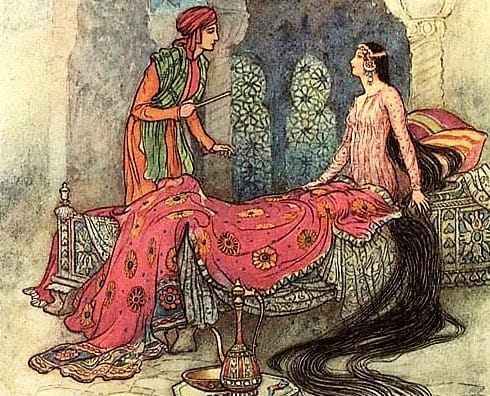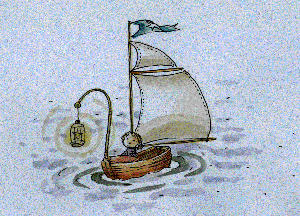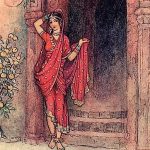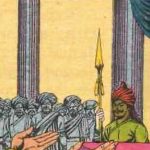- The Story of the Rakshasas (Folk-Tales of Bengal) – Part I
- The Story of the Rakshasas (Folk-Tales of Bengal) – Part II
Sahasra Dal and Champa Dal lived together happily for some time when a misunderstanding arose between them in this wise. There was in the service of the queen-mother a certain maid-servant who was the most useful domestic in the palace. There was nothing which she could not put her hands to and perform. She had uncommon strength for a woman; neither was her intelligence of a mean order. She was a woman of immense activity and energy; and if she were absent one day from the palace, the affairs of the zenana would be in perfect disorder. Hence her services were highly valued by the queen-mother and all the ladies of the palace.
But this woman was not a woman; she was a Rakshasi, who had put on the appearance of a woman to serve some purposes of her own, and then taken service in the royal household. At night, when everyone in the palace was asleep, she used to assume her own real form, and go about in quest of food, for the quantity of food that is sufficient for either man or woman was not sufficient for a Rakshasi.
Now Champa Dal, having no wife, was in the habit of sleeping outside the zenana, and not far from the outer gate of the palace. He had noticed her going about on the premises and devouring sundry goats and sheep, horses and elephants.
The maid-servant, finding that Champa Dal was in the way of her supper, determined to get rid of him. She accordingly went one day to the queen-mother, and said, “Queen-mother! I am unable any longer to work in the palace.”
“Why? What is the matter, Dasi? How can I get on without you? Tell me your reasons. What ails you?”
“Why,” said the woman, “Nowadays it is impossible for a poor woman like me to preserve my honour in the palace. There is that Champa Dal, the friend of your son-in-law; he always cracks indecent jokes with me. It is better for me to beg for my rice than to lose my honour. If Champa Dal remains in the palace I must go away.”
As the maid-servant was an absolute necessity in the palace, the queen-mother resolved to sacrifice Champa Dal to her. She therefore told Sahasra Dal that Champa Dal was a bad man, that his character was loose, and that therefore he must leave the palace. Sahasra Dal earnestly pleaded on behalf of his friend, but in vain; the queen-mother had made up her mind to drive him out of the palace. Sahasra Dal did not have the courage to speak personally to his friend on the subject; he therefore wrote a letter to him, in which he simply said that for certain reasons Champa must leave the palace immediately. The letter was put in his room after he had gone to bathe. On reading the letter Champa Dal, exceedingly grieved, mounted his fleet horse and left the palace.
As Champa’s horse was uncommonly fleet, in a few hours he traversed thousands of miles, and at last, found himself at the gateway of what seemed a magnificent palace. Dismounting from his horse, he entered the house, where he did not meet with a single creature. He went from apartment to apartment, but though they were all richly furnished he did not see a single human being.
At last, in one of the side rooms, he found a young lady of heavenly beauty lying down on a splendid bedstead. She was asleep. Champa Dal looked upon the sleeping beauty with rapture—he had not seen any woman so beautiful.
Upon the bed, near the head of the young lady, were two sticks, one of silver and the other of gold. Champa took the silver stick into his hand and touched with it the body of the lady, but no change was perceptible. He then took up the gold stick and laid it upon the lady, when in a trice she woke up, sat in her bed, and eyeing the stranger, inquired who he was.
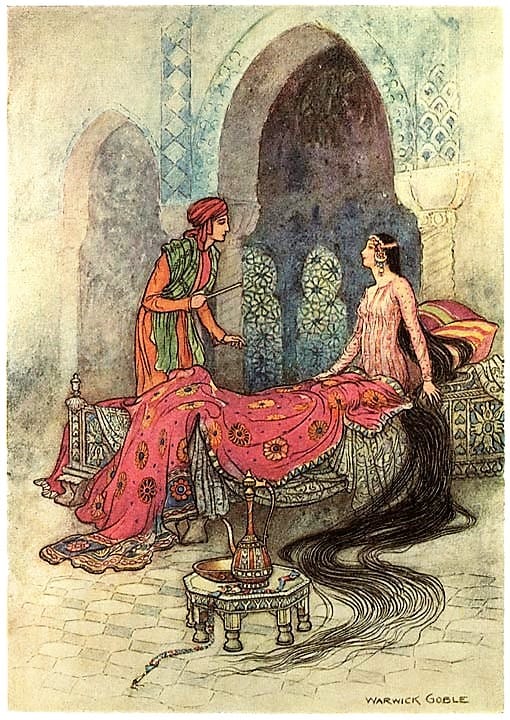
Champa Dal briefly told his story. The young lady, or rather princess—for she was nothing less—said, “Unhappy man! why have you come here? This is the country of Rakshasas, and in this house and round there live no less than seven hundred Rakshasas. They all go away to the other side of the ocean every morning in search of provisions, and they all return every evening before dusk. My father was formerly king in these regions and had millions of subjects, who lived in flourishing towns and cities. But some years ago the invasion of the Rakshasas took place, and they devoured all his subjects, and himself and my mother, and my brothers and sisters. They devoured also all the cattle of the country. There is no living human being in these regions except myself; and I too should long ago have been devoured had not an old Rakshasi, conceiving strange affection for me, prevented the other Rakshasas from eating me up. You see those sticks of silver and gold; the old Rakshasi, when she goes away in the morning, kills me with the silver stick, and on her return in the evening re-animates me with the gold stick. I do not know how to advise you; if the Rakshasas see you, you are a dead man.”
Then they both talked to each other in a very affectionate manner and laid their heads together to devise if possible some means of escape from the hands of the Rakshasas.
The hour of the return of the seven hundred raw-eaters was fast approaching; and Keshavati—for that was the name of the princess, so called from the abundance of her hair—told Champa to hide himself in the heaps of the sacred trefoil which were lying in the temple of Siva in the central part of the palace. Before Champa went to his place of concealment, he touched Keshavati with the silver stick, on which she instantly died.
Shortly after sunset, Champa Dal heard from beneath the heaps of the sacred trefoil the sound of a mighty rushing wind. Presently he heard terrible noises in the palace. The Rakshasas had come home from cruising, after having filled their stomachs, each one, with sundry goats, sheep, cows, horses, buffaloes, and elephants. The old Rakshasi, of whom we have already spoken, came to Keshavati’s room, roused her by touching her body with the gold stick, and said—
“Hye, mye, khye!
A human being I smell.”
On which Keshavati said, “I am the only human being here; eat me if you like.”
To which the raw-eater replied, “Let me eat up your enemies; why should I eat you?” She laid herself down on the ground, as long and as high as the Vindhya Hills, and presently fell asleep.
The other Rakshasas and Rakshasis also soon fell asleep, being all tired out on account of their gigantic labours in the day. Keshavati also composed herself to sleep; while Champa, not daring to come out of the heaps of leaves, tried his best to court the god of repose.
At daybreak all the raw-eaters, seven hundred in number, got up and went as usual to their hunting and predatory excursions, and along with them went the old Rakshasi, after touching Keshavati with the silver stick.
When Champa Dal saw that the coast was clear, he came out of the temple, walked into Keshavati’s room, and touched her with the gold stick, on which she woke up. They sauntered about in the gardens, enjoying the cool breeze of the morning; they bathed in a lucid tank which was in the grounds; they ate and drank, and spent the day in sweet converse. They concocted a plan for their deliverance. They settled that Keshavati should ask the old Rakshasi on what the life of a Rakshasa depended, and when the secret should be made known they would adopt measures accordingly. As on the preceding evening, Champa, after touching his fair friend with the silver stick, took refuge in the temple beneath the heaps of the sacred trefoil. At dusk the Rakshasas as usual came home; and the old Rakshasi, rousing her pet, said—
“Hye, mye, khye!
A human being I smell.”
Keshavati answered, “What other human being is here except myself? Eat me up, if you like.”
“Why should I eat you, my darling? Let me eat up all your enemies.” Then she laid down on the ground her huge body, which looked like a part of the Himalayan mountains. Keshavati, with a phial of heated mustard oil, went towards the feet of the Rakshasi, and said, “Mother, your feet are sore with walking; let me rub them with oil.”
So saying, she began to rub with oil the Rakshasi’s feet; and while she was in the act of doing so, a few tear-drops from her eyes fell on the monster’s leg.
The Rakshasi smacked the tear-drops with her lips, and finding the taste briny, said, “Why are you weeping, darling? What aileth thee?”
To which the princess replied, “Mother, I am weeping because you are old, and when you die I shall certainly be devoured by one of the Rakshasas.”
“When I die! Know, foolish girl, that we Rakshasas never die. We are not naturally immortal, but our life depends on a secret that no human being can unravel. Let me tell you what it is that you may be comforted. You know yonder tank; there is in the middle of it a Sphatikasthambha (Sphatika is crystal and sthambha pillar), on the top of which in deep waters are two bees. If any human being can dive into the waters, bring up to land the two bees from the pillar in one breath, and destroy them so that not a drop of their blood falls to the ground, then we Rakshasas shall certainly die; but if a single drop of blood falls to the ground, then from it will start up a thousand Rakshasas. But what human being will find out this secret, or, finding it, will be able to achieve the feat? You need not, therefore, darling, be sad; I am practically immortal.” Keshavati treasured the secret in her memory and went to sleep.
Early next morning the Rakshasas as usual went away; Champa came out of his hiding place, roused Keshavati, and fell a-talking. The princess told him the secret she had learnt from the Rakshasi. Champa immediately made preparations to accomplish the mighty deed. He brought to the side of the tank a knife and a quantity of ashes. He disrobed himself, put a drop or two of mustard oil into each of his ears to prevent water from entering, and dived into the waters. In a moment he got to the top of the crystal pillar in the middle of the tank, caught hold of the two bees he found there, and came up in one breath. Taking the knife, he cut up the bees over the ashes, and a drop or two of the blood fell, not on the ground, but on the ashes. When Champa caught hold of the bees, a terrible scream was heard at a distance. This was the wailing of the Rakshasas, who were all running home to prevent the bees from being killed; but before they could reach the palace, the bees had perished. The moment the bees were killed, all the Rakshasas died, and their carcases fell on the very spot on which they were standing.
Champa and the princess afterwards found that the gateway of the palace was blocked up by the huge carcases of the Rakshasas—some of them having nearly succeeded in getting to the palace. In this manner, the destruction of the seven hundred Rakshasas.
After the destruction of the seven hundred raw-eating monsters, Champa Dal and Keshavati got married together by exchanging garlands of flowers. The princess, who had never been out of the house, naturally expressed a desire to see the outer world. They used every day to take long walks every morning and evening, and as a large river was hard Keshavati wished to bathe in it.
The first day they went to bathe, one of Keshavati’s hairs came off, and as it is the custom with women never to throw away a hair unaccompanied with something else, she tied the hair to a shell that was floating on the water; after which they returned home.
In the meantime, the shell with the hair tied to it floated down the stream, and in the course of time reached that ghat at which Sahasra Dal and his companions were in the habit of performing their ablutions. The shell passed by when Sahasra Dal and his friends were bathing; and he, seeing it at some distance, said to them, “Whoever succeeds in catching hold of yonder shell shall be rewarded with a hundred rupees.” They all swam towards it, and Sahasra Dal, being the fleetest swimmer, got it. On examining it he found a hair tied to it. But such hair! He had never seen so long a hair. It was exactly seven cubits long.
“The owner of this hair must be a remarkable woman, and I must see her”—such was the resolution of Sahasra Dal.
He went home from the river in a pensive mood, and instead of proceeding to the zenana for breakfast, remained in the outer part of the palace. The queen-mother, on hearing that Sahasra Dal was looking melancholy and had not come to breakfast, went to him and asked the reason. He showed her the hair and said he must see the woman whose head it had adorned. The queen-mother said, “Very well, you shall have that lady in the palace as soon as possible. I promise you to bring her here.”
The queen-mother told her favourite maid-servant, whom she knew to be full of resources—the same who was a Rakshasi in disguise—that she must, as soon as possible, bring to the palace that lady who was the owner of the hair seven cubits long. The maid-servant said she would be quite able to fetch her.
By her directions, a boat was built of Hajol wood, the oars of which were of Mon Paban wood. The boat was launched on the stream, and she went on board it with some baskets of wickerwork of curious workmanship; she also took with her some sweetmeats into which some poison had been mixed.
She snapped her fingers thrice, and uttered the following charm:
“Boat of Hajol!
Oars of Mon Paban!
Take me to the Ghat,
In which Keshavati bathes.”
No sooner had the words been uttered than the boat flew like lightning over the waters. It went on and on, leaving behind many a town and city. At last, it stopped at a bathing place, which the Rakshasi maid-servant concluded was the bathing ghat of Keshavati. She landed with the sweetmeats in her hand.
She went to the gate of the palace, and cried aloud, “O Keshavati! Keshavati! I am your aunt, your mother’s sister. I am coming to see you, my darling, after so many years. Are you in, Keshavati?”
The princess, on hearing these words, came out of her room, and making no doubt that she was her aunt, embraced and kissed her. They both wept rivers of joy—at least the Rakshasi maid-servant did, and Keshavati followed suit through sympathy. Champa Dal also thought that she was the aunt of his newly married-wife. They all ate and drank and took rest in the middle of the day. Champa Dal, as was his habit, went to sleep after breakfast.
Towards afternoon, the supposed aunt said to Keshavati, “Let us both go to the river and wash ourselves.”
Keshavati replied, “How can we go now? My husband is sleeping.”
“Never mind,” said the aunt, “let him sleep on; let me put these sweetmeats, that I have brought, near his bedside, that he may eat them when he gets up.”
They then went to the river-side close to the spot where the boat was. Keshavati, when she saw from some distance the baskets of wickerwork in the boat, said, “Aunt, what beautiful things are those! I wish I could get some of them.” “Come, my child, come and look at them; and you can have as many as you like.” Keshavati at first refused to go into the boat, but on being pressed by her aunt, she went. The moment they two were on board, the aunt snapped her fingers thrice and said:
“Boat of Hajol!
Oars of Mon Paban!
Take me to the Ghat,
In which Sahasra Dal bathes.”
As soon as these magical words were uttered the boat moved and flew like an arrow over the waters. Keshavati was frightened and began to cry, but the boat went on and on, leaving behind many towns and cities, and in a trice reached the ghat where Sahasra Dal was in the habit of bathing.
Keshavati was taken to the palace; Sahasra Dal admired her beauty and the length of her hair; and the ladies of the palace tried their best to comfort her. But she made a loud cry and wanted to be taken back to her husband. At last, when she saw that she was a captive, she told the ladies of the palace that she had taken a vow that she would not see the face of any strange man for six months. She was then lodged apart from the rest in a small house, the window of which overlooked the road; there she spent the livelong day and also the livelong night—for she had very little sleep—in sighing and weeping.
In the meantime when Champa Dal awoke from sleep, he was distracted with grief at not finding his wife. He now thought that the woman, who pretended to be his wife’s aunt, was a cheat and an impostor, and that she must have carried away Keshavati. He did not eat the sweetmeats, suspecting they might be poisoned. He threw one of them to a crow which, the moment it ate it, dropped down dead. He was now the more confirmed in his unfavourable opinion of the pretended aunt.
Maddened with grief, he rushed out of the house and determined to go whithersoever his eyes might lead him. Like a madman, always blubbering “O Keshavati! O Keshavati!” he travelled on foot day after day, not knowing where he went.
Six months were spent in this wearisome travelling when, at the end of that period, he reached the capital of Sahasra Dal. He was passing by the palace gate when the sighs and wailings of a woman sitting at the window of a house, on the road-side, attracted his attention. One moment’s look, and they recognised each other. They continued to hold secret communications. Champa Dal heard everything, including the story of her vow, the period of which was to terminate the following day.
It is customary, on the fulfilment of a vow, for some learned Brahman to make public recitations of events connected with the vow and the person who makes it. It was settled that Champa Dal should take upon himself the functions of the reciter. Accordingly, the next morning, when it was proclaimed by the beat of the drum that the king wanted a learned Brahman who could recite the story of Keshavati on the fulfilment of her vow, Champa Dal touched the drum and said that he would make the recitation.
The next morning a gorgeous assembly was held in the courtyard of the palace under a huge canopy of silk. The old king, Sahasra Dal, all the courtiers and the learned Brahmans of the country, were present there. Keshavati was also there behind a screen so that she might not be exposed to the rude gaze of the people.
Champa Dal, the reciter, sitting on a dais, began the story of Keshavati, as we have related it, from the beginning, commencing with the words—“There was a poor and half-witted Brahman, etc.” As he was going on with the story, the reciter every now and then asked Keshavati behind the screen whether the story was correct; to which question she as often replied, “Quite correct; go on, Brahman.”
During the recitation of the story, the Rakshasi maid-servant grew pale, as she perceived that her real character was discovered; and Sahasra Dal was astonished at the knowledge of the reciter regarding the history of his own life.
The moment the story was finished, Sahasra Dal jumped up from his seat, and embracing the reciter, said, “You can be none other than my brother Champa Dal.” Then the prince, inflamed with rage, ordered the maid-servant into his presence. A large hole, as deep as the height of a man, was dug in the ground; the maid-servant was put into it in a standing posture; prickly thorn was heaped around her up to the crown of her head: in this wise was the maid-servant buried alive. After this Sahasra Dal and his princess, and Champa Dal and Keshavati, lived happily together for many years.
Thus my story endeth,
The Natiya-thorn withereth, etc.

